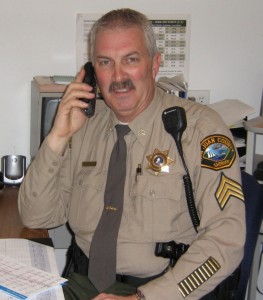
Sargeant Steve Vierthaler will be leaving the Orcas "beat" later this month.
Sergeant Steve Vierthaler will retire after over 35 years serving Orcas and Lopez Islands for the County Sheriff Department next week, on Feb. 22.
With Raymond Harvey staffing the front office, Vierthaler recounted some stories from his years on duty.
It’s a testament to Vierthaler’s straight-forward approach that he began his career in law enforcement from the “consumer” rather than the “supply” side: being a self-avowed juvenile hot-rodder and rebel, he had more than the usual number of encounters with cops where he grew up north of Seattle.
“I got stopped lots, and got to know the local police. Some were nice, some not. I realized their job was totally unique, the calls were never the same, you weren’t sitting behind a desk, it was exciting.
“Some of the cops were cool, and I try to remember to be the cool guy rather than the jerk.”
Vierthaler started out with the Seattle Police Department and, in search of full-time work, applied to every county in the state. He began the testing process with every place that responded. He remembers interviews where he was one of 500 applicants. In San Juan County, he placed first in the test and was offered the job on Orcas Island.
That was under Sheriff Don Brown, and Vierthaler joined Roger Dixon and Greg Doss. At the time, Vierthaler says, the Sheriff’s department had “no budget, horrible equipment, no computers, horrible pay, and one portable radio that we treated like gold.”
The three Orcas officers started the Sheriff’s guild to negotiate wages and working conditions and developed the force from three officers on Orcas to five (currently the Orcas sub-station is short one officer). Calls have tripled during those years.
In the beginning, the Sheriff’s Department was the only agency to deal with dead bodies, and Vierthaler has seen more deaths than he’d like. “You can only do that for so many years,” he says.
There’s been many occasions where he feared for his life. “Early on, I thought about it a lot, especially after hearing a story from my partner, Roger Dixon, who went after a man who’d axed down the door of his girlfriend’s house one night and then ran into the woods. There have been times I could have gotten hurt and didn’t, but at some point, it becomes something you think about afterwards,” Vierthaler said.
He started the canine program in 1978 at his own expense and for 12 years, the dogs Andie, and then Henry, were part of the Orcas police presence.
He’s seen some odd things: Moran Park campers who were insistent that a bear was outside their tent and demanded an officer come to deal with it; a military torpedo that floated up at Beach Haven — turns out it was a Canadian practice torpedo, but containing toxic fuel and worth over $200,000.
The greatest frustration in his job came with the search for Colton Harris Moore, the teenage “Barefoot Bandit” who has admitted to burglaries, break-ins and thefts, including bicycles and aircraft, on Orcas Island from 2008 to 2010. “We worked our hinies off, trying to catch him; it burned up our entire overtime budget and we weren’t able to take care of other issues.
“It was terrible because people did not feel safe in their homes; it terrorized people, especially older people. ”
Ultimately, through sharing information with other counties, notably Island and Snohomish counties, Orcas law enforcement was able to pinpoint Harris Moore. Vierthaler points out that while his office wasn’t able to catch him, “Nobody else caught him either.” (Harris Moore was finally apprehended in the Bahamas after he fled across the U.S.)
“We know he had help while he was here,” Vierthaler said. “The FBI is looking into it, but it’s hard to say if anything will come of it.”
On the positive side, he gets great satisfaction simply from “going home safely every night, knowing we’ve dealt with all the calls that came in that day.
“So many mornings as I put on my uniform and bullet-resistant vest and gun, I think, ‘what am I doing?'” The life-threatening dangers of the job become daily routine, but Vierthaler says, “It’s an odd feeling when I become aware of it.”
He is on call 24/7 and all after-hours calls that come to dispatch for Lopez and Orcas are referred to him to direct response. It is not unusual for him to be called five or six times between midnight and dawn.
“Common sense is our job,” he says. He finds the greatest challenge in dealing with “the system itself: the bosses, regulations and paperwork.” Because the Sheriff is elected by voters, the job is political, he says. “I’m pretty much an open book.”
He also is frustrated by the second- and third-hand information “that the island is notorious for.” Orcas isn’t Mayberry, or paradise, Vierthaler says. “There is so much people don’t know, they are so surprised to find the dirty underside.” We don’t have gangs; it’s not downtown Seattle, but there are [criminal] issues here — domestic violence, sexual assault, burglaries and theft.” Usually drugs are involved, Vierthaler says, alcohol, methamphetamines and legal, prescribed drugs. “They’re almost worse than illegal drugs,” he says. “And there are a fair amount of mental issues up here.”
If he were to advise his successor, Vierthaler repeats his code of fairness: “Treat people the way you’d like to be treated. Even a bad guy has rights.
“Take a look at the last 20 years and use what you’d like from it, but I wouldn’t make changes just for the sake of change.
“We’re not Mayberry, but you’re going to see people again and again and again. Never forget where you come from. The public is our customer — treat them fairly.”
**If you are reading theOrcasonian for free, thank your fellow islanders. If you would like to support theOrcasonian CLICK HERE to set your modestly-priced, voluntary subscription. Otherwise, no worries; we’re happy to share with you.**







Thank you Steve!!
Congratulations Steve! I hope your “cool guy rather than the jerk” approach can continue here. Many many thanks.
Wow Steve! The island will miss you! Your respected and liked by young and old….it’s been a honor to have worked with you through the years….catch you at NAPA? Best of luck!!!!
Kudos for your years of perspective-may your wisdom pass to the next generation. You have often seen that which others here will not. Thanks, Steve- for your humanity, intelligence, and all that other wordy crap I’m trying to say!
Lovely Interview! Thank you Steve for being your friendly, calm, respectful self through all the years you have given in Service to this community! Thank you for all of the dogs who served with you too! Many Blessings to you and your wife on your well-earned retirement!
Spirit Eagle and Domenic Verbano